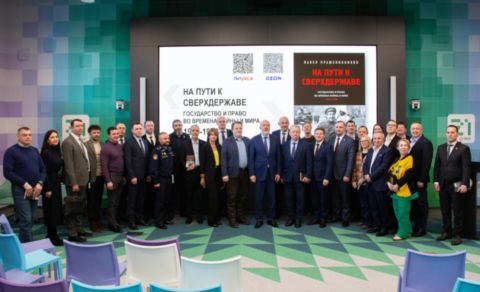Presentation of a new book On the Way to a Superpower. The State and Law in Times of War and Peace. 1939-1953, by deputy of the State Duma of the Russian Federation Pavel Krasheninnikov, was held in the hall of School 21 at South Ural State University on February 20th. This is the seventh book in a series on the history of the Russian state and law from Kievan Rus' to the present day.
Mainly SUSU students attended the presentation in person, but among those who joined the event online were students who filled whole classrooms at universities of our city and region, such as Chelyabinsk State University, South Ural State Agrarian University, South Ural State Humanitarian Pedagogical University, Chelyabinsk State Institute of Culture and Arts, Russian Presidential Academy of National Economy and Public Administration, and many others, including SUSU branches in Zlatoust and Nizhnevartovsk. The organizers estimate the total number of presentation audience as 1000 people.
“I would like to express my gratitude to Pavel Krasheninnikov for once again giving the presentation of his books within the walls of our university,” SUSU Rector Alexander Wagner addressed the audience. “The book touches upon the periods important for the development of our state: the Great Patriotic War, the pre-war time periods. It analyzes the legal regulation of all processes both within our country and in interaction with other states. In the year of the 80th Anniversary of the Victory, this is especially relevant.”
The new book by Pavel Krasheninnikov is dedicated to the history of laws. Nowadays, such legislative norms seem severe: criminal liability for truancy, failure to meet the target of workdays in collective farms, an eight-hour workday in a seven-day work week, food cards, the impossibility of changing jobs at your own will. And how can we not mention the resettlement of entire peoples! All this was formalized by legislative acts; the author examines in detail the role of Stalin, Beria, the Politburo, and Vyshinsky in the formation of legal norms.
Much attention is also paid to the norms of international law that were formed during the war and post-war years: during the Yalta, Potsdam and other conferences. The legal grounds for holding the Nuremberg Trials are examined in detail.
An important role in the book is given to the deed of homefront workers.
While presenting the book in the Ural region, the author himself, who was born and raised here, emphasized that no Victory would have been possible without the heroic home front. But the overwhelming majority of men had been called up to military service, and the main load had fallen on women and teenagers. During the hard years of war, having 3 times less metal and 4 times less coal than the Nazi Germany, the workers of the Soviet home front had produced 2 times more aircraft, almost 1.5 times more shells, bombs and mines than the industry of the Third Reich.
At the same time, the book is written in a vigorous style. One of the guests who spoke during the discussion noted: once the reader got this book, he came home at eight in the evening, opened it and could not fall asleep until he reached the last page.
“This series of works is dedicated to the development of our state. Starting from the 9th century, I show in what eras and how legislative acts were adopted, by whom and why they were prepared, what consequences they led to,” noted the author of the book Pavel Krasheninnikov. “It is important to know this in order to learn lessons from history and not make the same mistakes. I examine many archival documents. I pay great attention to the text. In the original version, the book turns out to be one and a half thousand pages, which is unacceptable for a publisher. The work on the narrative, polishing, selection of material begins.”
During the discussion, it was repeatedly said that it was Pavel Krasheninnikov who coined the term law of catastrophes. The war period in question had required urgent, sometimes instant but firm decisions. But even in the documents of that time, according to the author, one can discern the humanistic evolution of law.
The book was published by AST publishing company, and it is easy to find in online stores, both in electronic and paper form. Pavel Krasheninnikov himself admitted that most of the next, eighth volume of the series, dedicated to the laws of the Khrushchev Thaw period, is ready.
This is not the first time that SUSU has acted as the main platform for the presentation of Pavel Krasheninnikov’s books. Chelyabinsk, Magnitogorsk, the Ural region are native places for the author, he spent his childhood here, and he returns here with a special feeling. It is worth hoping that the presentation of the new volume of the cycle on Russian law by Pavel Krasheninnikov at SUSU is not far off.




